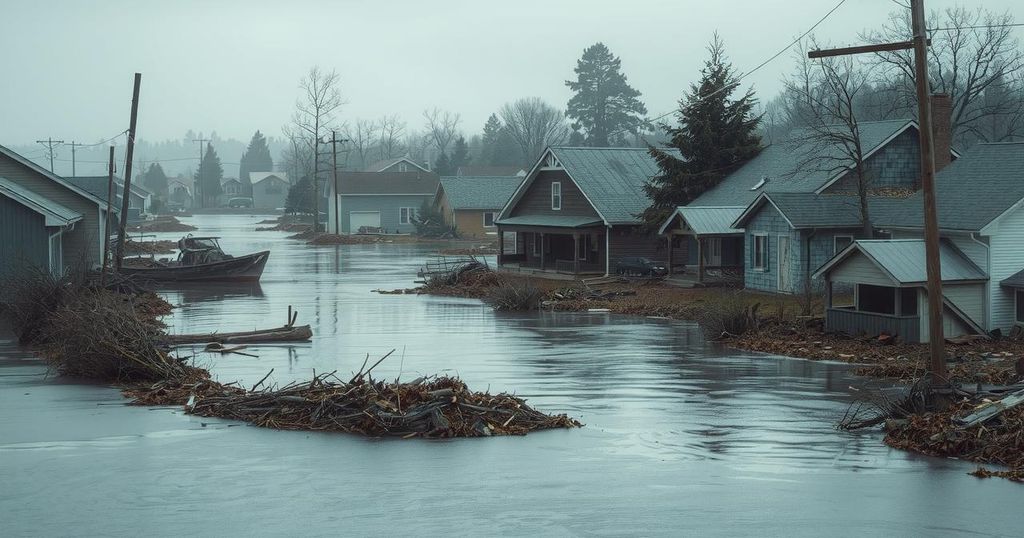Residents of Niger State Place Pressure on Government Amid Stench of Decaying Corpses

Devastating floods in Mokwa, Niger State, have led to the deaths of an estimated 200 people, with residents now confronting the stench from decaying corpses buried under debris. The situation has prompted government aid efforts totaling N3 billion, but ongoing health concerns remain as residents demand action to address the foul odor and support recovery efforts.
In the aftermath of catastrophic floods that hit Mokwa Local Government Area of Niger State, residents now face a grim reality. Nearly two weeks after the disaster, they’re grappling with the strong stench of decaying corpses that are thought to be those of flood victims, many still buried beneath debris and sand. The foul odor has become a painful reminder of the tragedy while presenting a growing health risk for the community.
The floods, which occurred on May 28 and 29, claimed an estimated 200 lives, according to local authorities. Reports from the Niger State Emergency Management Agency (NSEMA) confirm that over 50 homes were destroyed, displacing more than 3,000 people. The agency also indicated 161 recovered corpses, with many victims still unaccounted for, likely trapped beneath the muddy wreckage.
Just days after the waters receded, residents reported the nauseating smell intensifying with the wind. Esther Nwanosike, a local food vendor, expressed her concerns: “The smell is overwhelming, and I am concerned about the potential health implications.” She noted that many customers are struggling to tolerate the odor while eating in her shop. Nwanosike urged the government to take swift action to address the crisis by considering measures such as fumigation.
Alhassan Kolo, another resident, echoed the distress. He mentioned, “Some of the recovered corpses had become almost unrecognizable due to decay.” As he sifted through the sand and debris, his team found not only personal belongings but also more bodies. The community is anxiously searching for any remaining victims, showing just how deep and unsettling this issue runs.
Ahmed Yusuf lamented, “I believe the stench is from the corpses of those victims that had not been found,” as he highlighted the emotional toll on the families who have lost loved ones to the flood. He cautioned that immediate government intervention is critical for the community’s health and recovery.
One resident named Salihu Ishaq expressed the disbelief and trauma from the flood’s impact, reiterating the sheer number of casualties. “I have a sister who alongside her three children was swept away by the flood,” he lamented, adding that they are still searching for additional bodies.
In response to the mounting distress, both the Federal and state governments are stepping in. Vice President Kashim Shettima visited the area, pledging a N2 billion donation to help with rehabilitation efforts. Additionally, Niger State announced a N1 billion assistance package. At the same time, residents like Amina Abubakar, who lost her family members in the disaster, are urgently calling for aid amid their grief.
Officials have acknowledged the stench and established a prevention control team to tackle the issue. Idris Ibrahim, the Director of Public Health, stated that efforts are in place, ensuring that the problem is addressed as quickly as possible. Regarding relocation, he confirmed that discussions are ongoing but did not disclose specific plans yet.
The NSEMA’s spokesman confirmed collaboration between the federal and state governments to assist victims. He also elaborated on the complexities surrounding the source of the odor. “This is a residential area with many household toilets. The floodwaters swept through homes, exposing sanitation, human waste, and body decomposition,” he cautioned.
Adding to the complexity, Niger State Governor Mohammed Bago mentioned that the floods may have originated from foreign lands, suggesting waters from the Niger Republic could have contributed to the disaster. His statements highlight the precarious geography and climatic factors at play.
Bago assured the public that advocacy is ongoing to move residents away from vulnerable coastal areas. During a visit from Borno’s Governor Babagana Zulum, a donation of N300 million was also announced to support the victims, aiming to assist in their recovery efforts while urging the federal government for more robust climate strategies.
As the affected communities grapple with this dual crisis of odor and loss, there looms an urgent need for coordinated response efforts from various levels of government, not just for relief but for systematic recovery and future prevention.
The catastrophic floods in Mokwa Local Government Area have resulted in a heart-wrenching loss of life and an ongoing health crisis due to the stench of decaying corpses. While government relief efforts are underway, residents continue to face immediate dangers from both the bodily remains and unsanitary conditions. There’s a pressing call for further action to manage the health risks and plan for long-term recovery, as the community deals with the haunting memories and challenges brought on by this disaster.
Original Source: punchng.com







